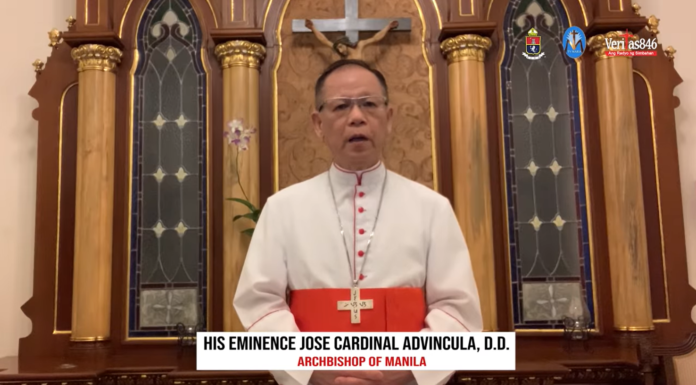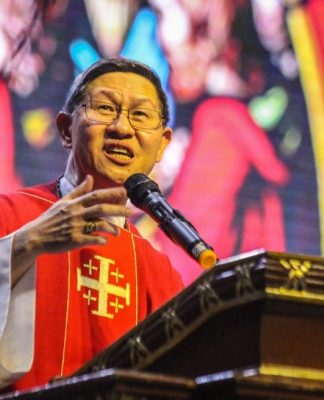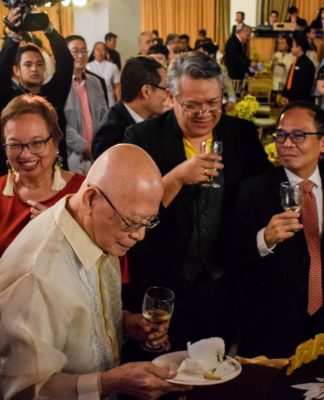MAY PAG-ASA pa bang mapasigla ang pinangangambahang tuluyang pananamlay ng pananampalatayang Tomasino?
Tangan ang pagkilalang “tanging Katolikong Pamantasan sa Pilipinas”, nararapat lamang na masubaybayan ng mga Tomasino ang kasalukuyang kalagayan ng mga pang-relihiyong tanggapan ng UST.
Kaugnay rito, minabuti ng Varsitarian na kapanayamin Padre Rodel Aligan, O.P., ang Vice-Rector for Religious Affairs at Direktor ng Institute of Religion. Nasa ilalim ng pamamahala ni P. Aligan ang apat na tanggapan: ang bagong tatag na Center for Contextualized Theology and Applied Ethics (theology center), ang Community Development Office (CDO), and Institute of Religion (IR), at ang Center for Campus Ministry (CCM).
Ayon kay P. Aligan, ang Community Development Office ang tanggapan na pinakamatagumpay sa apat.
“We have community develoment programs sa Tarlac at sa Pampanga. A long-term planned program where all communities are present in their own learning center, where teachers are teaching through modules,” aniya.
Kabilang sa mga pangunahin proyekto ng CDO ang Hasik Center for Development, edukasyong di-pormal para sa mga mahihirap, at pagtatag ng mga “self-reliant” na komunidad.
Samantala, tinukoy din ni P. Aligan ang kahalagahan ng pagkakatatag ng theology center. Malaking tulong daw ito sa layunin ng pang-relihiyong sangay ng Unibersidad na higit na mapasigla, hindi lamang ang pananampalatayang Tomasino, kung hindi maging ng buong rehiyon ng Asya.
“There is the need for a Center for Contextualized Theology and (Applied) Ethics to be institutionalized because we want to make theology relevant, not only for Thomasians, but especially for Asians. That’s one center piece of the administration of the Rector.”
Bahagi ng kabuuang plano ng bagong tatag na tanggapang ito ang pagsasagawa ng “curriculum review” tungkol sa Teolohiya sa Asya, pagsusuri sa kabutihan, dedikasyon, at kahusayan ng mga guro sa Teolohiya, at ang pagtuturo ng Ethics.
Pagtutuos
Bilang mga pangunahing tanggapan sa ilalim ng kanyang pamamahala, higit na pinagtutuunan ng pansin ni P. Aligan ang IR at ang CCM. Ayon sa kanya, ang mga ito ang mga departamentong tuwirang nakaaapekto sa mga mag-aaral, na siyang pangunahing isinasaalang-alang ang kapakanan.
Ayon sa kanya, may nakatakda nang programa para sa mga miyembro ng IR.
“I see the need to improve and the need to uphold (the institute) because the students nowadays are much different from yesterday. They are more exposed to media, so no matter how good the teacher is, the kind of methodology he’s using only catches the ears, and not the other parts of the body; its effectivity is incomplete,” pahayag ni P. Aligan.
“We are venturing into new paradigms in teaching Theology. We’re actually planning to implement “team-teaching”. In one week, the Theology class will be for one whole day, exposing the students into different methodologies. We are pioneering this in cooperation with our pilot colleges, the Faculty of Arts and Letters and the College of Rehabilitation Sciences, wherein we’re having a very good reception so far because the deans are cooperative,” dagdag pa niya.
Mayroon ding sagot ang pari sa karaniwang reklamo ng mga Tomasino sa kanilang mga guro—ang pagiging madalas na pagliban sa klase ng mga ito. “Actually those professors who suffer from chronic absenteeism have sanctions from Academic Affairs. We apply the rules of the CBA and that of the University as well,” ani P. Aligan.
Sa kasalukuyan, dagdag pa niya, higit silang nagiging mapili sa kanilang mga aplikante. “We have to go through the records of the prospective professors, plus we consider their moral integrity. Currently, if you’ll look at the percentage of the faculty, most of them (Theology professors) were seminarians before. (Although) nowadays, we are getting a lot of young religious heads, which is very good. Pero sa kanila naman, okay ‘yung methodology, but you still have to give them some input.”
Sa kabilang bahagi, pag-aalala naman ang dulot ng kasalukuyang kalagayan ng OCM sa pamunuan ni P. Aligan. Ayon sa kanya, alam niyang nangangailangan nang higit na matamang pansin ang tanggapan dahil sa kinakaharap nitong tila paghinto ng pag-unlad.
“I think their job is not simply limited to giving recollections and retreats. Marami pang iba. They are doing what they have been used to doing. But I know they are aware that they should not be limited to that. Kailangan i-reorganize (ang CM)” ani P. Aligan.
Tinawag din niya ang pansin ng Campus Ministry ukol sa usapin ng mababang bilang ng mga Tomasinong lumalahok sa mga pang-relihiyong organisasyon ng mga Unibersidad (Student Religious Organizations).
“These SRO’s are under the Campus Ministry. Unless they are not being taken care of by the Campus Ministry, siyempre they will find no reason for non-existence. We need a certain kind of revival. Kailangan i-improve talaga dahil ‘yun pa naman ang (tanggapan) para sa mga estudyante. IR is for the classroom while the Campus Ministry is for students when they’re already outside the classroom.”
“Kaya minsan ‘di mo makita ‘yung relationship between what is being taught and what is being lived. ‘Yun ang problema. When you see students living what is being taught they can become good examples to others,” dagdag ni P. Aligan.
Sa hangarin na higit na maunawaan, tinukoy ni P. Aligan ang mga bagay na inaasahang mabibigyan ng pansin ng tanggapan.
“Ang trabaho ng Campus Ministry ay ang spiritual formation of the students and faculty members, at ang dalawang pinakamahalaga, new creative evangelizing activities and supervision of student religious oganizations,” aniya.
Ipinapayo niya sa mga namamahala ng OCM na isaalang-alang ang kasalukuyang kalagayan ng lipunang ginagalawan ng mga mag-aaral.
”They should consider (for these SRO’s to be effective) that students nowadays are really different. Sometimes it takes things to go on a one-on-one encounter or group sessions. They should set their goals clear.”
Paanyaya
Bilang isang mahalagang sangay ng pamunuan ng Unibersidad, hangad ng mga tanggapang pang-relihiyon ang malawak na pang-unawa mula sa Tomasinong komunidad sa kinakaharap nilang hamon na muling pagsasabuo at pagpapatibay ng kanilang pundasyon.
At isang malaking hakbang ang maiaambag ng panunumbalik ng sigla ng pananampalataya ng bawat isa, partikular na ng mga mag-aaral.
“Joining SRO’s makes your faith relevant to God. Because, after all, the faith that is given to us is supposed to be a faith that is livable. And the same thing would be the core of being a committed, competent and compassionate Thomasian,” panawagan ni P. Aligan sa gitna ng hindi-kasiguruhan ng Campus Ministry.
Gayundin, bilang nagsisilbing kinatawan ng sangay ng Relihiyon, ipinahayag ni P. Aligan na bagamat masasabi niyang handa niyang harapin ang hamon ng naluluoy na pananampalatayang Tomasino, masasabing walang mararating ang anumang dakilang layunin kung mananatiling kibit-balikat lamang ang sagot ng bawat isa at kawalang pagpapahalaga’t pagtanggap ang kapalit ng bawat pagsisikap.

















